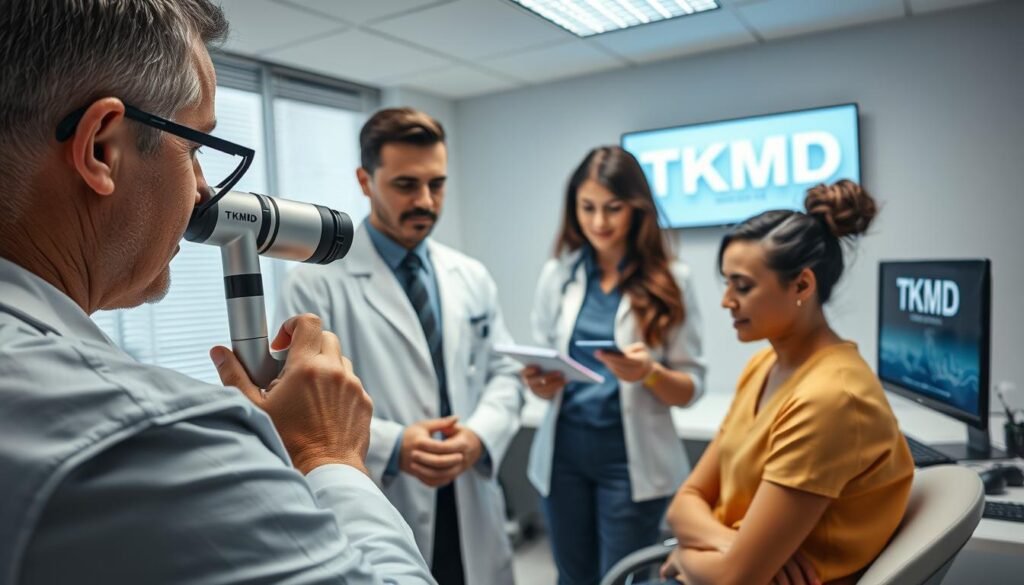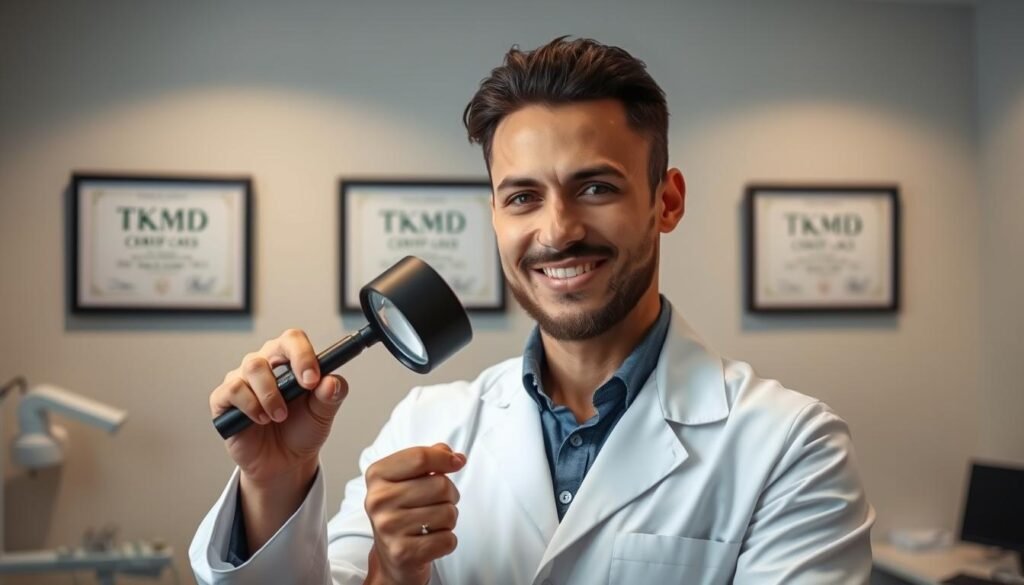Experiencing hair loss can be a distressing and emotionally challenging ordeal, affecting not just one’s appearance but also their self-esteem and overall well-being. It’s a condition that impacts millions of Americans, making it crucial to understand the appropriate steps to address it.
Different hair loss conditions require different approaches, from hormonal imbalances to scalp conditions and genetic factors. Knowing which specialist to consult can be the first step towards effective treatment and regaining confidence.
Early diagnosis and treatment by the right specialist can significantly improve outcomes, potentially reversing certain types of hair loss. This guide aims to empower you with the knowledge to navigate the healthcare system and find the appropriate doctor for your specific hair loss concerns.
Key Takeaways
- Understanding the cause of your hair loss is crucial for determining the right specialist.
- Dermatologists and trichologists are key professionals who diagnose and treat hair loss.
- Different conditions may require different specialists, from hormonal issues to scalp conditions.
- Early diagnosis and treatment can significantly improve treatment outcomes.
- Consulting the right doctor can potentially reverse certain types of hair loss.
Understanding Hair Loss and When to Seek Help
Losing hair is a natural process, but significant or sudden hair loss can be a sign of an underlying issue. It’s normal for individuals to lose 50 to 300 hairs daily, often without noticing. However, when hair loss increases or is accompanied by other symptoms, it can be a cause for concern.
Common Types of Hair Loss
Hair loss can be categorized into several types, including androgenetic alopecia (male and female pattern baldness), alopecia areata (autoimmune-related), telogen effluvium (stress-induced shedding), and scarring alopecia. Understanding these different types is crucial for determining the appropriate course of action.
Warning Signs That Require Medical Attention
Sudden or severe hair loss, patchy hair loss, scalp inflammation, and hair loss accompanied by other symptoms like fatigue or weight changes are warning signs that require prompt medical attention. Certain conditions, such as thyroid disorders, hormonal imbalances, nutritional deficiencies, and autoimmune diseases, can manifest as hair loss and require specialized treatment.
The Importance of Early Diagnosis
Early diagnosis is crucial as some types of hair loss can be reversed if treated promptly. Delayed treatment may lead to permanent loss, especially in cases of scarring alopecia. Seeking professional help at the first signs of unusual hair loss can prevent progression and provide more treatment options.
- Understanding the difference between normal hair shedding and problematic loss is essential for determining when medical intervention is necessary.
- Men and women experience different patterns of hair loss—men typically develop receding hairlines and bald spots, while women often experience overall thinning with preservation of the frontal hairline.
For Hair Loss Which Doctor to Consult: Specialist Options
The journey to addressing hair loss begins with identifying the appropriate medical professional to consult. Hair loss can stem from a variety of causes, including medical conditions, genetics, and lifestyle factors, making it essential to seek the right expertise.
Dermatologists: The Primary Hair Loss Specialists
Dermatologists are medical doctors who specialize in conditions related to the skin, hair, and nails. They are equipped to diagnose and treat hair loss, identifying underlying causes such as autoimmune diseases, skin conditions, or other medical factors affecting hair follicles. A dermatologist can perform diagnostic tests like scalp biopsies and microscopic hair examinations to recommend appropriate treatments.
Trichologists: Hair and Scalp Experts
Trichologists specialize in the study of hair and scalp disorders. While they are not medical doctors, they provide valuable insights into hair and scalp health, offering non-prescription treatments and care regimens. Trichologists often work alongside dermatologists to provide comprehensive care for individuals experiencing hair loss.
Other Medical Professionals to Consider
In addition to dermatologists and trichologists, other specialists can be consulted for hair loss.
Primary Care Physicians
Primary care physicians can serve as the first point of contact, performing initial evaluations and referring patients to specialists when necessary.
Endocrinologists
Endocrinologists are relevant when hair loss is suspected to be related to hormonal imbalances or thyroid disorders.
| Specialist | Area of Expertise | Role in Hair Loss Treatment |
|---|---|---|
| Dermatologists | Skin, hair, and nail conditions | Diagnose and treat hair loss, perform diagnostic tests |
| Trichologists | Hair and scalp health | Provide non-prescription treatments and care regimens |
| Primary Care Physicians | General health | Initial evaluation and referral to specialists |
| Endocrinologists | Hormonal imbalances | Treat hair loss related to hormonal issues |

What to Expect During Your Hair Loss Consultation
Understanding what to expect during a hair loss consultation can help alleviate concerns and prepare you for the diagnosis. A thorough examination is crucial in determining the underlying cause of your hair loss.
Diagnostic Procedures and Tests
During your initial consultation, the specialist will conduct a thorough examination of your scalp and hair. This may include pull tests to assess active shedding, dermoscopy for a magnified scalp examination, and potentially a scalp biopsy if necessary.
- Pull tests to assess active shedding
- Dermoscopy for magnified scalp examination
- Blood tests to check for nutritional deficiencies or hormonal imbalances
- Scalp biopsies in some cases
Questions Your Doctor Will Ask
Your doctor will ask detailed questions about your hair loss history, including when it began, any changes in pattern or severity, and your family history of hair loss. They will also inquire about recent illnesses, medications, and your hair care routine.
Preparing for Your Appointment
To make the most of your consultation, come prepared by documenting your hair loss with photos, keeping a log of symptoms, and bringing a list of medications and supplements. This information will assist in accurate diagnosis and treatment planning.

Conclusion
Effective hair loss treatment is highly dependent on identifying the underlying cause and consulting a specialist who can provide targeted care. For both men and women, hair loss can stem from various factors including genetics, hormonal changes, and medical conditions. Dermatologists, with their expertise in skin and scalp health, are typically the primary specialists for hair loss. Early intervention is crucial as it can prevent permanent damage to hair follicles. Treatment options range from medications to laser therapy and surgical interventions. It’s essential to be patient and consistent with treatment, as visible results often take several months. Addressing both the physical and emotional aspects of hair loss through medical care and possibly counseling can provide comprehensive support.


